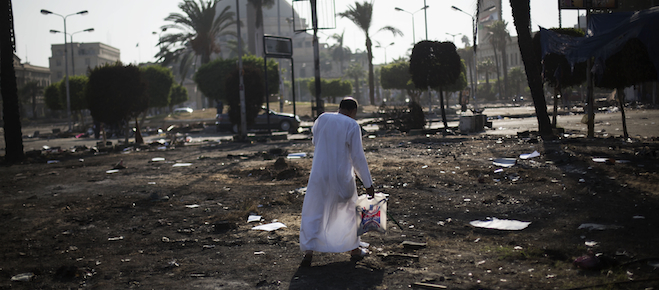The truth about the Arab Spring
… and what it means for what comes next in Egypt
An Egyptian walks amid charred debris of the Nahda sit-in camp, which was destroyed Wednesday by security forces, in Cairo, Egypt, Thursday, Aug. 15, 2013. Egypt faced a new phase of uncertainty on Thursday after the bloodiest day since its Arab Spring began, with hundreds of people reported killed and thousands injured as police smashed two protest camps of supporters of the deposed Islamist president. Wednesday’s raids touched off day-long street violence that prompted the military-backed interim leaders to impose a state of emergency and curfew, and drew widespread condemnation from the Muslim world and the West, including the United States. (AP Photo/Manu Brabo)
Share

Egypt has seen brutal violence during the past two days. With at least 525 dead (and counting) and thousands injured, the nation representing the keystone of the wobbly arch that is Middle-East stability is at the cusp of what could become civil war.
It’s the kind of scenario in the ill-fated Arab Spring that everyone hoped would be avoided. But now, as supporters of the Muslim Brotherhood battle Egypt’s security forces on the streets of Cairo and other major cities, the reality of an Arab Winter looms large.
Two years ago, it seemed something monumental was in the making. Millions of Egyptians, risking the wrath of an increasingly oppressive regime led by ousted President Hosni Mubarak, took to the streets to demand a better future. The economy topped the agenda as a new generation of young, educated Egyptians decided it had enough of an aging elite that seemed more interested in maintaining its grip on power than creating a prosperous nation.
The electrifying events that followed dominated television screens from New York to Sana’a. As the world watched, a dictator was brought to his knees by the very people he had sought to dominate. The world cheered as Egyptians took control of their destiny, ending decades of authoritarianism with a resounding call for democracy.
It was supposed to be a revolution, but in reality it was not. “This was a popular revolt,” the International Crisis Group, a leading Brussels-based think tank, wrote in its February 2011 post-mortem of the Egyptian revolution. “But its denouement was a military coup.”
Many experts agree: what Egypt experienced in 2011 was not a revolution but a well-orchestrated transition of power, with the military pulling the strings, as it always has.
It was a masterful stroke. In a matter of weeks, Egypt’s generals gave the boot to a troublesome dictator, while maintaining the illusion of political non-interference in a genuine democratic transition. Egypt then held its first free and fair elections. The results were not surprising: the street-savvy, well-organized Muslim Brotherhood won a clear majority under the guise of a new political movement, the Freedom and Justice Party. Liberals and secularists were left looking disorganized and purposeless.
But the Brotherhood politicians quickly learned that winning elections is the easy part of democratic governance. During the past year, the genetics of its authoritarian pedigree clearly surfaced. Making no effort at creating consensus, its leaders, and newly elected President Mohamed Morsi in particular, pushed ahead with an aggressive power grab, sidelining liberal and secular voices and pushing through an Islamist-friendly constitution. In the process, the Brotherhood alienated a significant segment of Egypt’s population — those who did not vote for the Freedom and Justice Party.
More importantly, the Muslim Brotherhood failed to address the economic stagnation plaguing Egypt. In their defence, a year is a blip in economic terms, but the party’s abject failure further angered Egyptians, leading to mass protests at the end of June. This prompted the Egyptian military to intervene once again and carry out what, on reflection, must be considered Egypt’s second coup in as many years.
The Egyptian democratic experiment now lies in tatters. It’s not difficult to deduce that the experiment itself was carried out under the watchful eye of the military, which remains the dominant institution in Egypt. Military interests are the overriding factor in Egyptian politics, and the Muslim Brotherhood has threatened those interests.
In August 2012, Morsi initiated a shake up of the senior military command, forcing then Commander in Chief Hussein Tantawi into retirement, to be replaced by Abdel Fattah el-Sisi. Sami Anan, then chief of army staff, was also retired, as was the head of the navy, Mohab Memish.
Events in Egypt’s neighbouring countries amplified the army’s mistrust of Morsi and the Brotherhood. The Brotherhood’s strongest supporters, the Islamist-leaning Justice and Development Party (AKP) in Turkey, led by Prime Minister Recep Tayyip Erdogan, had emasculated the Turkish military over a decade of legal cases targeting senior military officers in an alleged Deep State plotting to overthrow the government.
There’s little doubt that the Egyptian army, and its American-educated Commander in Chief el-Sisi in particular, watched events unfold in Turkey with trepidation. The AKP crushed anti-government protests in June, and recent convictions, including a life sentence for one former army chief relating to the alleged coup plot, have created a regional environment that threatens military dominance.
The Egyptian military’s response, however, to what have been largely peaceful sit-ins demanding the reinstatement of Egypt’s first democratically elected president has removed any illusion that Egypt was ever on any unrestricted path to democracy. The U.S. response tells volumes: joint military exercises scheduled for early September have been cancelled and the Egyptian military’s $1.3-billion yearly windfall, courtesy U.S. taxpayers, is under scrutiny.
The international response to the violence will be crucial. The path to democracy, at its infancy in the Middle East, will take many years. That long and winding road has reached a crucial fork: one way leads to Islamist domination, the other to military dictatorship. The former is the road least traveled, and the best of the worst options.